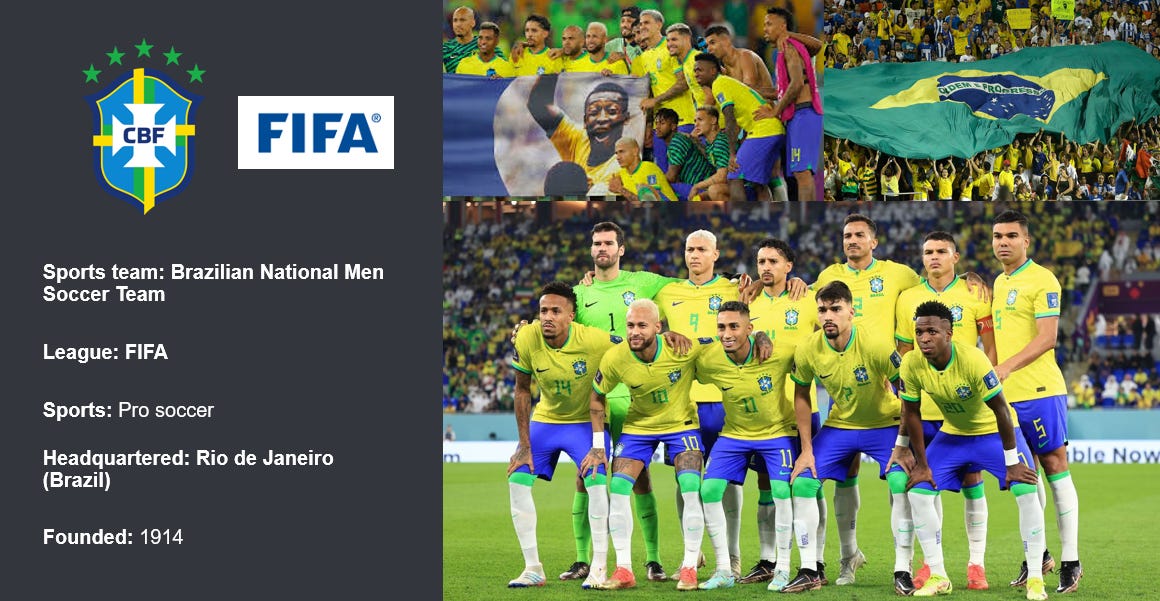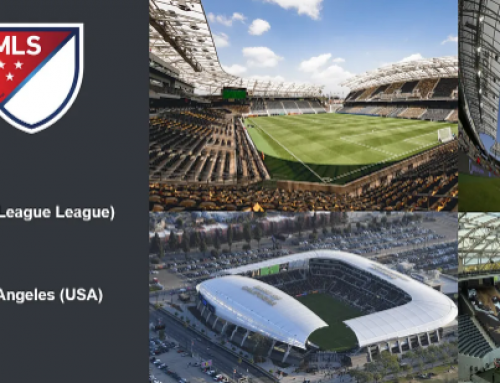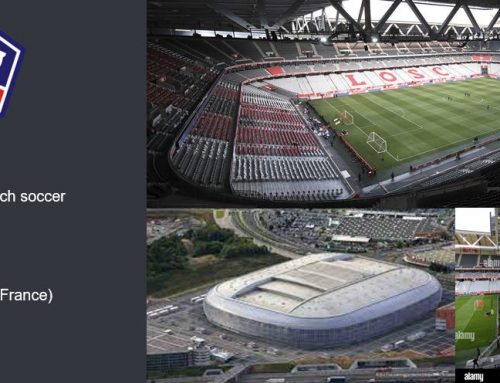Dear Colleagues,
This week we are profiling and interviewing the Brazilian Men National Soccer Team, the most successful national team in the FIFA World Cup, being crowned winner five times.

Sports team: Brazil national football team
Federation: Confederação Brasileira de Futebol (CBF)
Headquartered: Rio de Janeiro (Brazil)
Founded: 1914
Website: Confederação Brasileira de Futebol
Sports team background: The Brazil national football team nicknamed Seleção Canarinha, represents Brazil in men’s international football and is administered by the Brazilian Football Confederation (CBF), the governing body for football in Brazil. They have been a member of FIFA since 1923 and a member of CONMEBOL since 1916.
Brazil is the most successful national team in the FIFA World Cup, being crowned winner five times: 1958, 1962, 1970, 1994 and 2002. The Seleção also has the best overall performance in the World Cup competition, both in proportional and absolute terms, with a record of 76 victories in 114 matches played, 129 goal difference, 247 points, and 19 losses. It is the only national team to have played in all World Cup editions without any absence nor need for playoffs, and the only team to have won the World Cup in four different continents: once in Europe (1958 Sweden), once in South America (1962 Chile), twice in North America (1970 Mexico and 1994 United States), and once in Asia (2002 South Korea/Japan). Brazil is also the most successful team in the now-defunct FIFA Confederations Cup, winning it four times, in 1997, 2005, 2009, and 2013.
In ranking standings, Brazil has the highest average football Elo rating, and the fourth all-time peak football Elo rating, established in 1962. In FIFA’s ranking system Brazil holds the record for most Team of the Year first ranking wins with 13. Many commentators, experts, and former players have considered the Brazil team of 1970 to be the greatest team of all time. Other Brazilian teams are also highly estimated and regularly appear listed among the best teams of all time, such as the Brazil teams of 1958–62 and the squads of the 1994–02 period, with honorary mentions for the gifted 1982 side. In 1996, the Brazil national team achieved 35 consecutive matches undefeated, a feat which they held as a world record for 25 years.
Brazilian national soccer team’s favorite technologies used:
- GPS Vendor: STATSports
- HR Monitoring vendor: Polar
- Thermography vendor: Flir
- Sleep monitoring vendor: OURA

This week, we interviewed Guilherme Passos, the sports scientist for the Brazilian National Soccer Team.

?Show Notes: Through this interview, we touched on Passos’ background and his role at the Brazilian national soccer team and federation (Selecao). We also touched on the importance of technologies, his decision process when buying new technologies, and the best coaches and players (e.g. Neymar Jr, Vinicius Jr, Casemiro, Marquinhos, etc..) he worked with.
Best Quotes: Here’s some of the key discussion points and best quotes from our conversation with Guilherme:
- On his academic experience:
- “I have a degree in sports science, physical education here in Brazil. I’ve done my Master’s in sports science studying, especially thermoregulation in athletes, and how they adapt to the heat. And then I did my PhD in sports science, and especially in load management in football. So I did both my degrees at the UFMG a University here in Brazil”.
- On his experience in elite sports:
- “I’ve been working in pro soccer since 2006. I started helping one of my professors who was a well known sports scientist. Then I started working in a swimming team with some Brazilian Olympic athletes.
- “And afterwards I started working at CBF in 2013 with the youth teams, and the youth team U15 I was also asked to be part of the youth female teams. Then one year later, I started working with the youth men’s teams. Then I got the position as a sports scientist at CBF to work at the training facility there”.
- I think that I am the first person to be hired full-time by CBF in this role. It happened in 2014. So afterwards I worked with all the national teams in the training center, the male, female and youth to professional teams. I helped the team in 2014, and in 2018 at both Soccer Work Cups, in Brazil and Russia. Then after 2018, I got the full-time position with the professional team. I worked in two Copa Americas, 2016 Olympic Games, and 2022 Soccer World Cup”.
- On his responsibilities at the Brazilian national team:
- “When I don’t have the players with me, my job consists in monitoring the players when they are at their clubs. So I try to get all the information from the clubs on our Brazilian players in terms of physical preparation, load monitoring (…) And also some nutritional aspects as well as I work alongside the nutritionist of our team”.
- “Part of my job is also to look for new technologies to monitor the players, to track them, and assess them when they are with us. And after that, when we are with the players, I usually work as a normal sports scientist on a daily basis, like in a club”.
- “I monitor the players using GPS. I track their recovery state. I usually do all these things with the players and I also help the strength and conditioning coach in each training session”.
- On the importance of technologies and professional experience:
- “Technology is very important and I agree with you to not use the term injury prevention with technologies. Technologies can be used to mitigate or to try to reduce the players’ injuries. Because by using technologies we can make more informed based decisions if we have more data. And I truly believe that professional experience is also an important part on that”.
- “So technologies such as the tracking systems, the systems to assess players recovery, and players’ load, are quite important, but professional experience is also very important”.
- On his favorite technologies:
- “I like using GPS systems with some internal load management & monitoring systems to measure the heart rate or a player RPE information both together”.
- “I think that is a good mix of information should and can help make decisions regarding the fitness and fatigue state of the player (…) Using these technologies, you can give some good feedback to the coach”.
- On how he is gathering players’ data from various clubs where the Brazilian players play throughout the season and the challenges he has to overcome”:
- “The problem is that I gather GPS data on my players from the clubs but sometimes clubs use different GPS vendors. So they have different metrics, and different thresholds. I try to put everything together in other technology tools such as a business intelligence software like Power BI, Tableau and I take all the data together to create some stats or some graphs for the coaches to make sense with the data”.
- “The clubs all together send us data from 50 to 55 players every time (Before FIFA periods) because we don’t know exactly which Brazilian players are going to be called to play for the national team each time”.
- On the fact that he collects his players’ GPS, cardio (HR) and sleep/HRV data from the clubs:
- “We collect our players’ cardio data, GPS data, and some physical tests that the clubs usually do with the players. We also bought in 2019 some sleep trackers like Oura. We gave some Oura rings to some players and we could track their sleeping data and their heart rate variability as well”.
- On the important criteria he uses when deciding to buy new technologies:
- “I think that the relevance of the information is important. Then the quality & reliability of the information regarding scientific aspects is also critical. If it measures what I want to measure. Then there is the practicality of the technology because there are a lot of technologies that are impossible to use on a daily basis in football”.
- “I usually explain to the coach how a new technology will help us. And I have to get some thoughts from the head coach and the physical coach as well. And then I usually check the pricing and if some other professionals have been using the same technology, to collect some feedback from them”.
- On some of the best coaches he worked for:
- “I worked with some coaches here at the Brazilian national team. The last one that we worked together for the 2022 World Cup was coach Tite. He has an impressive way of working. He empowers all the members of his team. And he gives voice to everyone so we can share our thoughts. This type of coaching for me is the best …. Obviously coaches are the ones that will make the decisions, but Tite listens to everybody, and empowers everyone in the team staff”.
- “I also worked with Carlos Guilherme Dalla Dea. He is working now with the U20 Corinthians team. He was an impressive coach and it was very interesting because he was specialized in teaching young players. He has a way of teaching youth players and he could show the importance of everything the right way. So that was impressive as well”.
- “Carlos Amadeu was another one that was a really good coach. Paolo who is also coaching a U20 team. These are very, very good coaches as they empower their staff as well”.
- On some of the best players (e.g. Neymar Jr, Vinicius, etc.) he worked with:
- “Neymar Jr is impressive. His skills are impressive. He gives a lot for the team and he helps the team not only on the pitch, but outside of the pitch because of the leadership that he has”.
- “And also Casemiro … he is very professional player inside and outside of the pitch. Marquinhos, the defender, is also impressive. I have also known Vinicius Jr since he was 13 years old, when he first played for the U15 national team”.
- “Vinicus Jr gives the team another dimension because he’s so light, he’s so happy all the time. He’s also so friendly, and I’m talking not only inside the pitch because he is an impressive player. All those players are very good football players. But outside the pitch, Vinicius Jr helps a lot with the mood and his behavior as well”.



Leave A Comment
You must be logged in to post a comment.